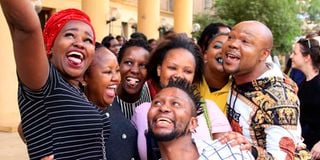End homophobic, transphobic violence against LGBTQ+ persons

Supporters of LGBT at the High Court in Nairobi during the case on the decriminalisation of gay sex in Kenya in 2019.
What you need to know:
- LGBTQ persons in Kenya face high rates of sexual and gender-based violence.
- They suffer stigma, discrimination, physical and verbal abuse, assault, harassment, eviction from their homes, job losses and suspension and even expulsion from school, among other ills.
Lesbians, gay, bisexual, transgender and queer (LGBTQ) persons in Kenya face high rates of sexual and gender-based violence. They also face obstacles accessing justice and rehabilitative mental health services.
Like any other Kenyan citizens, the LGBTQ persons should be protected against all forms of violence and discrimination. There have been numerous cases of the LGBTQ+ community being insulted and called discriminatory names online, among other painful and shocking atrocities.
LGBTQ+ persons have often been on the receiving end of mistreatment, globally. They suffer stigma, discrimination, physical and verbal abuse, assault, harassment, eviction from their homes, job losses and suspension and even expulsion from school, among other ills.
Though it is often said that one’s Sexual Orientation, Gender Identity or Expression (Sogie) is a non-issue, the violence meted upon the said persons is undeniably a big issue. It affects their quality of health and life.
Violence is further perpetrated against them through laws that criminalise sex between two consenting - same sex adults.
These laws create a misguided perception that lesbian, gay, bisexual and queer individuals are criminal; a perception that subsets of the State and religious institutions advance to further perpetuate human rights violation and acts of violence.
“Being a lesbian or gay is a non-issue. Being harmed because of who we are is a huge issue,” said Lorna Dias, the Executive Coordinator of the Gay and Lesbian Coalition of Kenya, Nairobi in July, 2015.
The law stigmatises and discriminates against the LGBTQ+ persons on the basis of their sexual orientation.
Report violations
They face difficulties accessing services, are kicked out of their homes, receive death threats and are often ridiculed. Unfortunately, it remains unclear where and how these persons can report violations against them.
LGBTQ+ persons have a right to equality and freedom from discrimination of all forms. They require equal protection against any form of violence and the right to equality, including all fundamental freedoms.
This community is not seeking special rights; basic human rights are not special rights. The right to get and keep a job based on merit, is not a special right; the right to be served food in a restaurant is not a special right; the right to have housing is not a special right; the right to walk down a street and not be attacked because of who you are and whom you love, is not a special right.
A Kenya Human Rights Commission report published in 2011 indicated that 18 per cent of LGBT Kenyans had revealed their sexual orientation to their families. Of these, 89 per cent were subsequently disowned.
Criminalisation, discrimination, and violence inhibit the access to HIV prevention and treatment for those of them that are infected. Men who have sex with men (MSM) are often more likely to be infected with HIV than the general population, and have been identified by health agencies as a key population in addressing the HIV epidemic.
Covid-19
During the Covid-19 period, Kenya has witnessed an increase in gender-based violence cases and the LGBTQ+ community has severely been affected to the extent that some lives have been lost.
Cases of online bullying and trolling on platforms like Twitter and Tiktok towards this special group during the pandemic has also increased, especially when many are trying to develop coping mechanisms to reduce Covid-19 impact on their mental health.
Access to safe shelter for the LGBTQ+ community remains a challenge as most are run by NGOs whose funding is unreliable.
Adequate holistic support system is still a challenge with issues like justice and psychosocial support yet to be realised.
Kenya should commit to end all forms of violence and discrimination against the LGBTQ+ community by publicly condemning any form of homophobic and transphobic violence.
Everyone was created equal and we all have the right to live with dignity and respect.
Kenya should end discrimination and violence against LGBTQ+ persons by ensuring acts of violence against them are condemned and prosecuted.
Alvin Mwangi is a sexual reproductive health and rights advocate, Nairobi, Kenya





